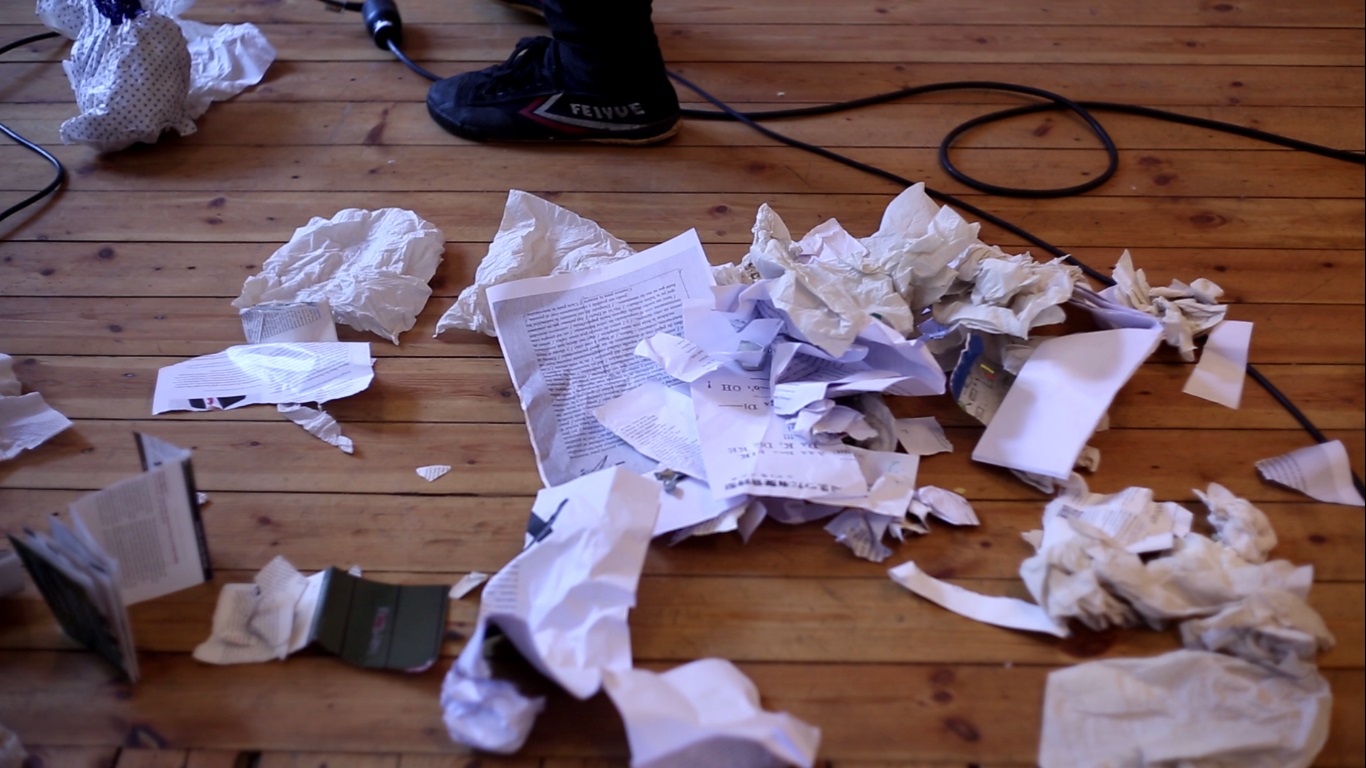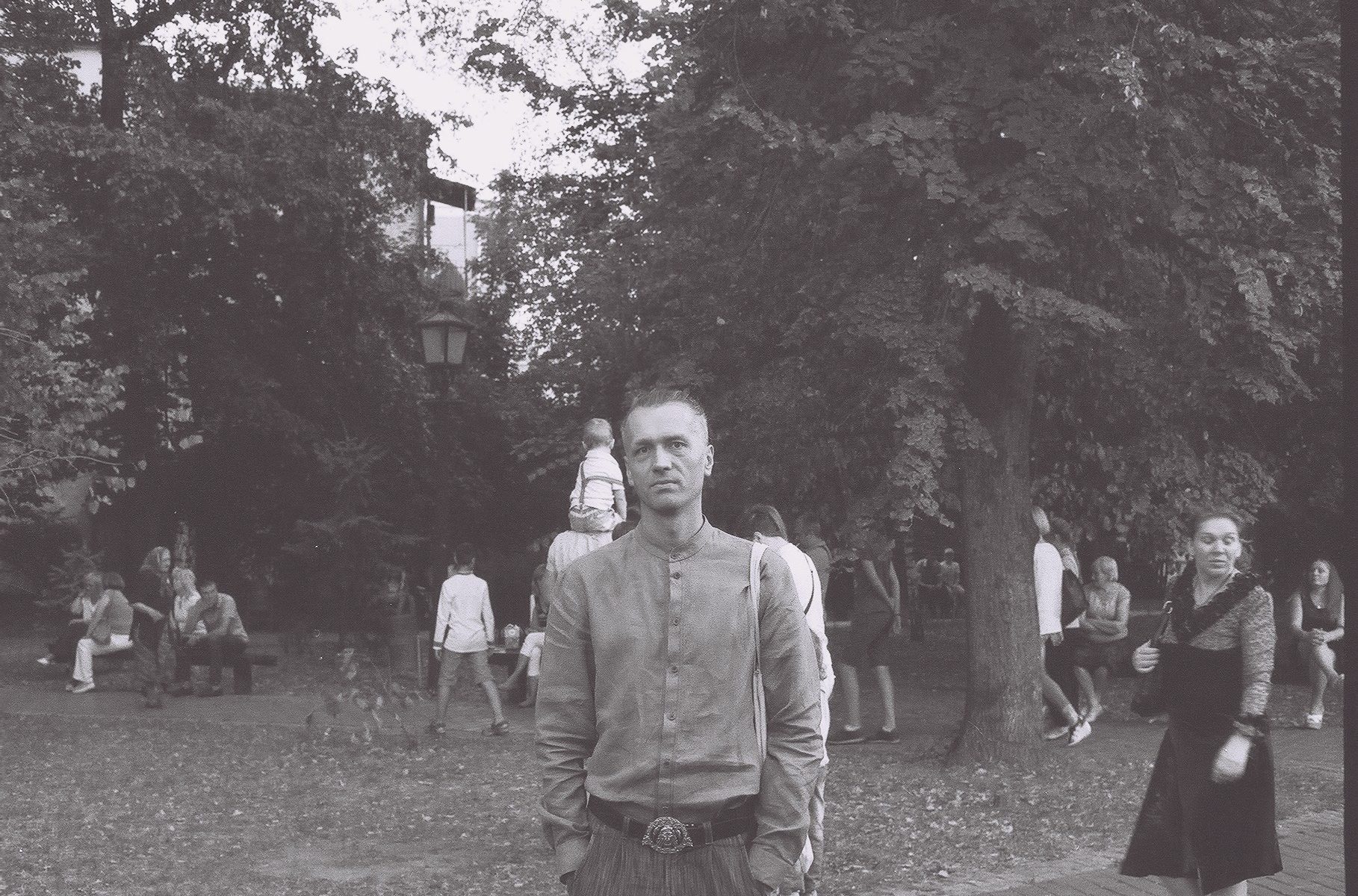On the ‘War in the park’ installation, with photos and text by Yevgenia Belorusets and Charlotte Warsen
by Sieglinde Geisel, translated from German by Elizabeth Toole.
This evening we are not just entering a room in the Lettrétage on the Mehringdamm. Instead, we are travelling in just a few minutes a distance of over 1,300 kilometres, from Berlin to Kiev. Poet Charlotte Warsen accompanies us via headset on this mental journey. Her voice picks us up and lets us know that we are travelling. “If you were not here right now, would something more exciting be happening to you somewhere else?” The voice knows that we would rather be out on the street in the evening air and that, considering the chairs piled up in the room, fear having to stand up for the entire evening. The invitation said “8-11pm” and it is only know that I understand that it is not really the duration of the event, but rather a period of time during which we can stay as long as we can manage.
I follow the voice’s instructions. She leads me into the back room and into the park in Kiev, where Ukranian-German artist Yevgenia Belorusets took photographs. The recording from the headset lasts 13:25 minutes. It was up to me how long I lingered in the back room. The photographs hang on two walls opposite each other, on the front wall in between them is a poem, with lines distributed in groups on white paper.
Yevgenia Belorusets photographed the war in her hometown of Kiev, namely in the park, where the war was not raging. On the contrary, the soldiers here are recovering from being deployed in the east of the Ukraine. The pictures are black and white, deliberately unpretentious and intimate, slightly grainy. What would I have seen in these pictures, if I had looked at them without knowing the background? At first glance, I would have thought it was in the west and probably from the past. Would I have detected the war? Upon the second glance probably. I would have noticed the men’s uniforms and the pair’s tension. What does the war mean to them? The men seem in high spirits, as do the women, for other reasons.

There are some things I cannot decipher. Two men in uniform sit cheerfully on a bench, one is lifting up his T-shirt and showing off his perfectly clear Che Guevara tattoo on his side. He is proud of it, but just a little. A drunk stands near a tree, he cannot keep his balance and appears cheerful, perhaps just because of the alcohol in the bottle he is carelessly holding.
Outside on the Mehringdamm it is dark, nothing can be seen through the paned windows of the Lettrétage, only black. The voice in the headset tells me to look out at the park, right here in front of the black window. We would certainly have seen the four figures from the photograph loitering just now, the four soldiers whom Yevgenia Belorusets photographed from a distance. Three of them are sitting on the grass, with a building behind them, and a fourth stands in front, in an upright position, as if something depended on whatever it may depend on here in the park. I recognise the war most clearly in the posture of this soldier, this posture does not belong in a park, it brings the war into the park.
As I observe these photographs, messages reach me from a distant war. The war breaks into everyday life in the park. Pensioners sit at the stone tables, they chat and pass the time. It is possible that the soldiers sitting on the grass or on the park bench killed someone a few days ago. It does not seem to bother them.
The poem on the wall cannot be read conventionally. The eye wanders, and I notice a division. The words on the left hand side belong together, as do the ones on the right. Some of them are from the past, ”Does this now also constitute my heart”, others are modern, “a small flock / inherits an air bubble / which lies in paradise and / can freely feel from within / and softly hums“.
The white parts of the text lead the eye around, among the word islands. ”Carefully lay down your eyes“, suggests the voice from the headset. The poem is like a park, the white areas are the ground, the words and phrases the things in the park. Some phrases seem like an old statue, now and then you come across a flowerbed, a pond, and sometimes I feel like I am tripping over words in my way. Curiously, the war is there in single fragments of words. “Wounds and would-be words stroll about here”, “In flashes, something casually bloodthirsty erupts like Hagen from Tronje / jerkily drawing back”. Yet, I might also have deluded myself.

